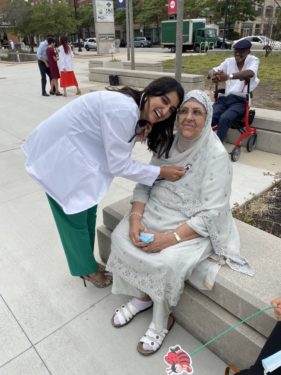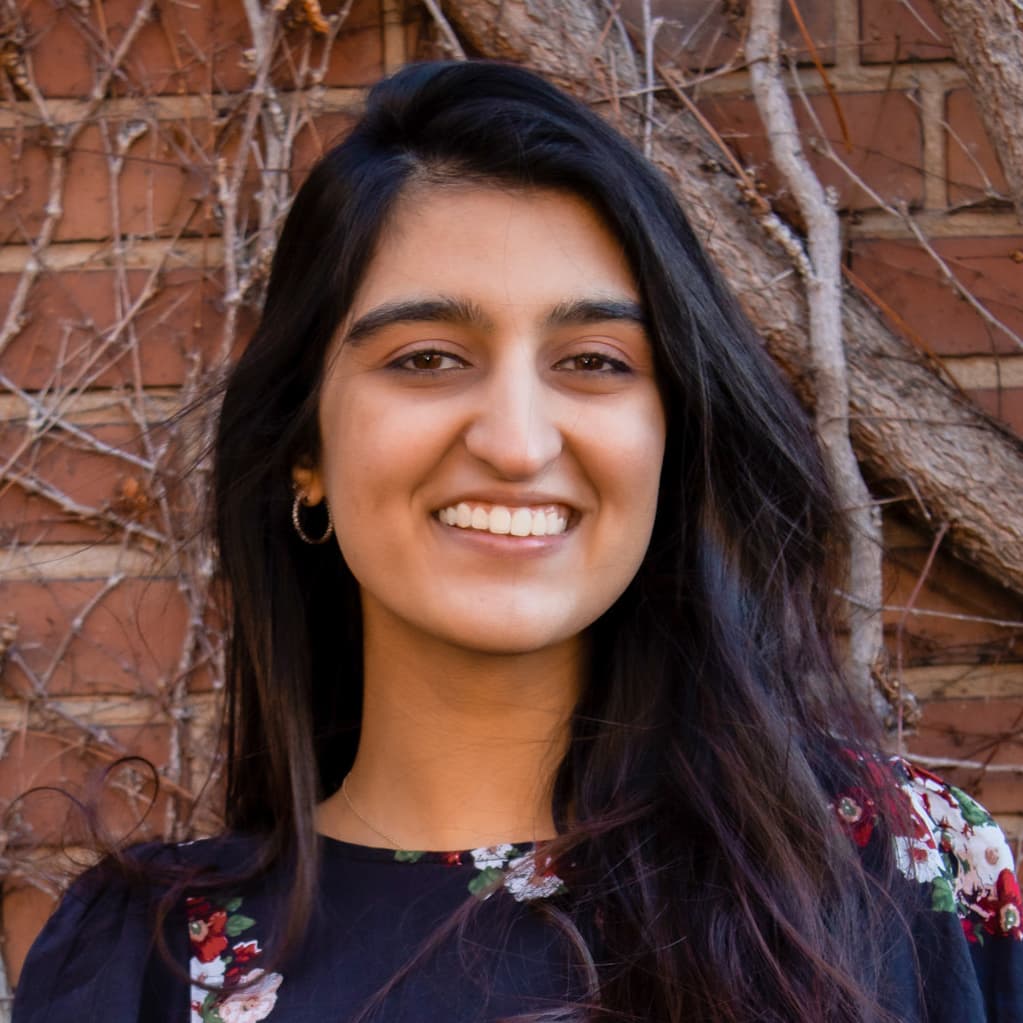From dream to disillusion, writer Hana Ahmed navigates the first year of medical school.
To make it through medical school, being a doctor nearly must be your calling. For me, I thought it was. I crack jokes with my parents, reminding them that they got lucky: They never had to abide by the Asian immigrant trope of pushing their kids to become a doctor; they wound up with one.
A semester into my first year of medical school — the beginning of a journey I have dreamt about forever — I’ve wanted to quit a total of too many times already. And not for any of the reasons I anticipated. To unpack this, let’s talk about why I wanted to be here in the first place.
Science has always fascinated me, and I tugged on threads about why the world and my body work the way they do. But when I tried wet-lab research for a summer, I felt empty without the human touch of a clinic.
As a first-generation American, I reflected frequently on how I would make my ancestors proud. My great-grandfather, a member of parliament in India, was a household name for his leadership in the Indian-Muslim community. His brother was a beloved social worker. I grew up regaled by stories of my father’s parents: a teacher and an honest businessman who passed away before I ever met them. I wanted to build a life that would make the sacrifices of my parents and their elders well worth it. Medicine felt like a career that would enable me to dedicate myself to improving the lives around me, like I heard my ancestors did.
In my application essays, I wrote about wanting to gain the skills necessary to support someone at their most vulnerable moments. When I was 12, I witnessed the pain that my mother endured after a miscarriage. In the months leading up to it, whispers conveyed the anguish she and my father went through in deciding whether they needed to have an abortion. Her previous pregnancy had exacerbated the hole in her heart, and this pregnancy could have jeopardized her life. Two years earlier, I remembered holding onto my father as we lay next to my napping baby sister. He warned me of the responsibilities that may come my way if my mom never returned from the hospital.

As the eldest daughter in an immigrant family, being a caretaker felt like it was written into my genetic code. Writing about my mom’s journey for my medical school applications raised a lot of emotions in me for the first time, because my parents’ love and strength had shielded me from the experience as a child. The application process often left me in tears, but the tears served as a testament to the certainty with which I felt that this was my calling. I was, and still am, a kid with insatiable passion and intrigue. I saw medicine as the intersection of all that drove me: people, science, policy, and art.
So much to learn, so little time
Why then, do most days leave me wanting to quit medical school? My first two years consist of a pre-clinical curriculum. Primarily classroom-based, we learn about the body systems in preparation for our third and fourth year clerkships, when we start participating as providers in the hospital. Right now, we’re learning about all the different ways someone can get sick. We have conversations about the human condition too, about structures and systems that leave people vulnerable to such sicknesses, but these discussions feel unfinished and overwhelming.
There is so much to learn and so little time, that we hardly get a moment to appreciate the beauty of what we know and how we function. For now, it feels like we’re expected to deal with all the stressful parts of medicine without any of the gratification that comes with caring for an actual person.
Elitism exists within our classrooms, too, which is only natural given the number of barriers that exist for getting here in the first place. People are outwardly kind; we share resources and help each other understand difficult concepts. Yet, sometimes it feels like people do so with a sense that they are better or more deserving than the person they’re sitting next to. And that attitude is understandable because to match into a competitive residency, you must prove that you are better than the person next to you.
This makes the social landscape hard to navigate. As I filtered through all the “racial healing circle” emails in my inbox after someone in student leadership used the n-word, I wondered just how we got here. We’re put in a hyper-stressful environment where we need to rely on each other to get by, but we never got to know each other as people first, classmates second. We don’t get to operate at our best or give each other the benefit of the doubt, because we’re all just trying to survive and pass the next exam, which almost always comes way earlier than we thought it would.
I’ve been facing a steady disillusionment, too. At my school’s hospital, we treat a majority of Illinois’ incarcerated patients. Yet, we only have one lecture about incarceration, in our second year. That feels like an afterthought because I already know that imprisonment negatively impacts most of a person’s social determinants of health.
It angers me that many of my professors feel helpless to change the systems — or don’t care to. Additionally, several of my classmates claim to be apolitical, which frightens me because I entered medical school believing that medicine is inherently political; it’s not practiced in a vacuum. The politics that surround us often determine who is in our clinics and how sick they are. What happens if we’re teaching a generation of future doctors how to treat an illness, but not reminding them how to care for a person?
Purpose in an imperfect system
Some people might chalk up my frustrations to naivete. There is no perfect healthcare system. However, it’s so hard to stay motivated when I entered the profession hoping to improve peoples’ lives, but frequently face the very reasons that leave people distrustful of the healthcare system. Already I feel complicit in all the wrong parts of the institution, while I have yet to even “save” a single life.
I can’t be the only person who feels lost on this journey. After all, suicide rates are the highest amongst physicians, relative to other careers. An entire football stadium came screeching to a halt after NFL player Damar Hamlin had a cardiac arrest in the middle of a game, but entire healthcare teams are expected to go right back to work after responding to a code where a patient dies.
As a doctor, especially in training, you’re on the front lines. You’re forced to reckon with all the circumstances that bring someone closer to death, and often, without any tangible way to improve their circumstances. You’re working long hours with limited resources in order to ensure that patients = profit.
I consistently choose to focus on the good and put away the bad, for now. I remind myself to be grateful. People sacrifice so much for this opportunity. I pull myself together so I can attend the next class and pass the next exam. I promise myself that I won’t get jaded to people’s suffering; I will always work towards my original vision of what it means to be a doctor.
This focus allows me to reimagine what medicine can be and to look for inspiration in people who are practicing it already. There are doctors that dedicate entire clinics to caring for survivors of human trafficking, people living with disabilities, or other populations that often fall through the cracks. I aspire to emulate those physicians who build their career around creating the multidisciplinary teams and building the community networks required to care for the entirety of a person, not just their illness.
Thankfully, I have a support system that carries me through. Some of my best friends are in the class ahead of me, and they offer advice about how to navigate this journey. My long-distance partner, also a medical student, shares his incredible experiences of working in the clinic. I have, fortunately, found a few classmates who operate on the same value system as me, who help me feel connected in this process. And I have my parents and family, who ground me and remind me that I make them prouder with each passing day.
Most importantly, in the few times so far that I have been in a clinical space, I remember why I could never have chosen another profession. Moments that most doctors get used to refresh my ambition. After watching my first C-section, I saw the awe on a mother’s face as she held her first baby, when moments before the gynecology team cut and then meticulously repaired numerous layers of tissue. I got teary-eyed while reading a heartwarming note written to an ER doctor because her charisma and care touched a patient in a moment of pain. I feel unstoppable when I can calm my friend’s anxieties about the tremors they get after using an inhaler, because I know that albuterol is a beta-2 agonist that opens the lungs but also activates the skeletal muscles.
I can only imagine the emotional rollercoaster that awaits me as I begin clinicals a year from now. And I eagerly anticipate that chapter. I’m confident that I can be the doctor I want to be even within an imperfect system. It may not be easy, but I know that every hand held and every crisis averted will be one more person that I have reached, hopefully for the better.

Hana Ahmed is a medical student based in Chicago. Her journalistic practice helps inform her role as an advocate in the healthcare field.












